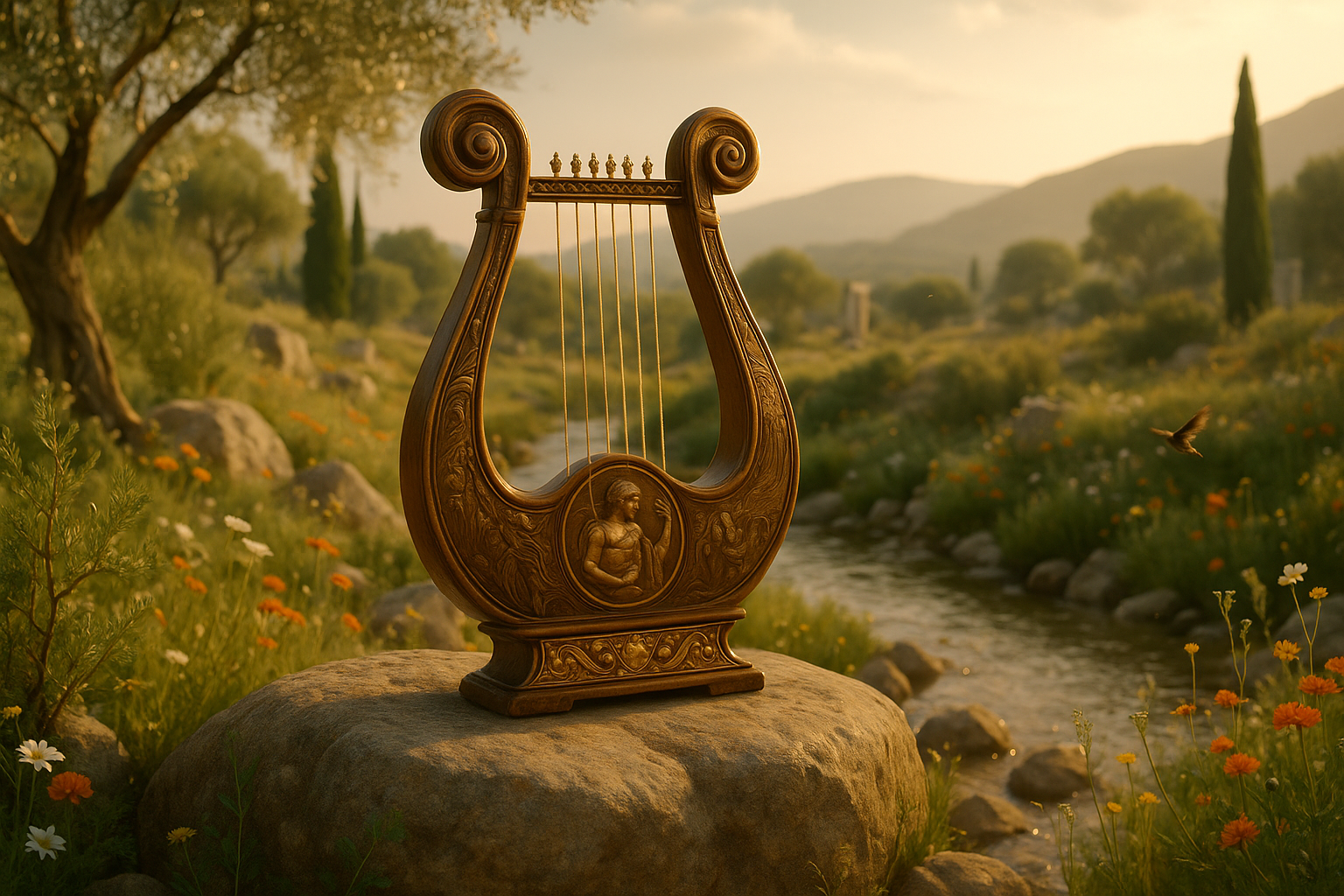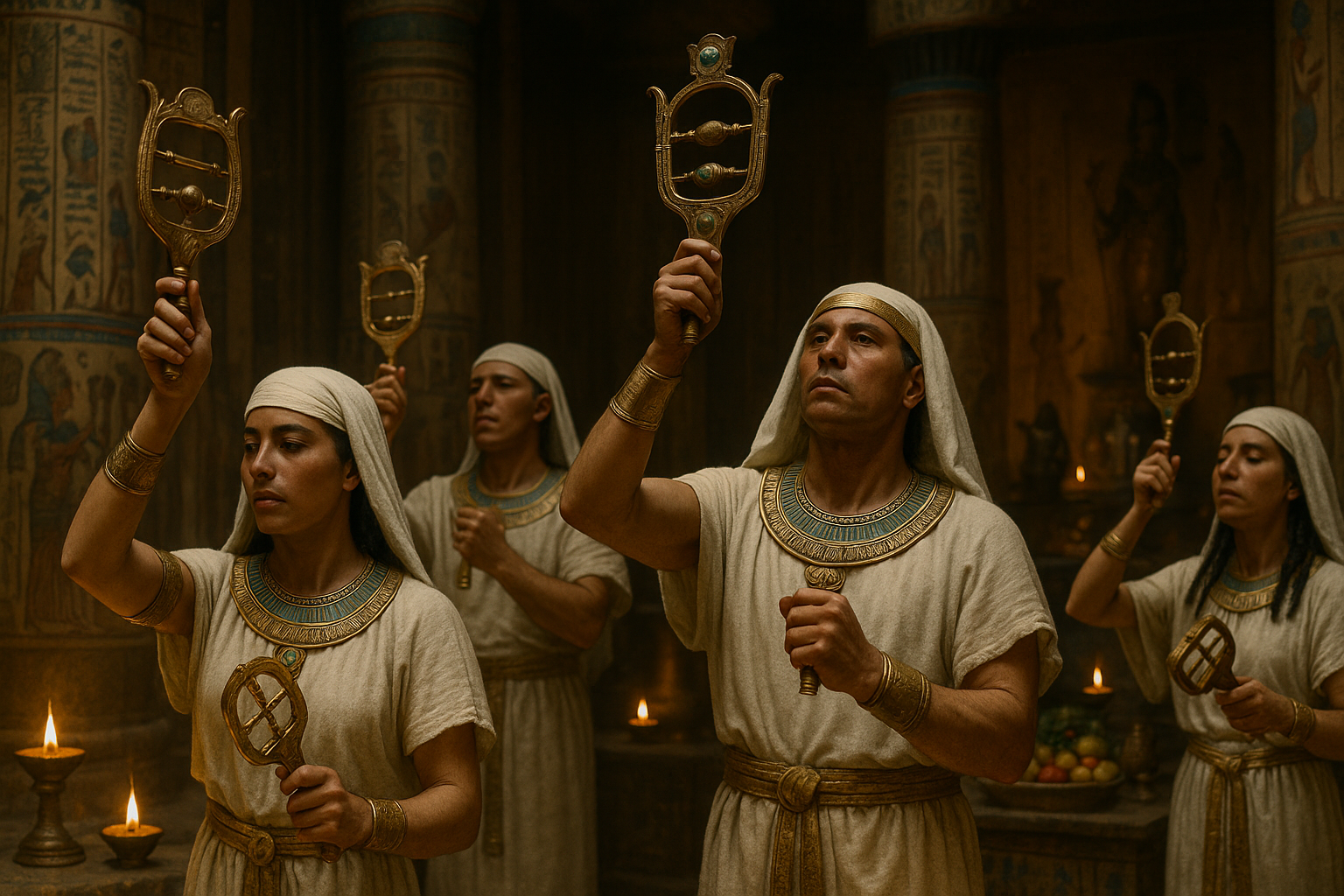In the shimmering cradle of ancient Greece, where gods mingled with mortals and epic tales were spun from the very fabric of the cosmos, the lyre emerges as a symbol of divine harmony and poetic inspiration. This seemingly humble instrument holds a profound significance that reverberates through the corridors of history and myth alike. 🎶
As we delve into the enchanting world of lyres, we uncover a rich tapestry woven with the threads of mythology, music, and culture. These ancient stringed instruments are not merely relics of a bygone era; they are vibrant echoes of a past where music was both a form of communication with the divine and a means of expressing the deepest human emotions. From the fingers of legendary figures like Orpheus to the symbolic resonance in tales of Apollo, the lyre plays a pivotal role in the enchanting stories that have shaped Western cultural heritage.
At the heart of this exploration is the intricate connection between the lyre and the gods of Greek mythology. It is said that Hermes, the cunning messenger of the gods, crafted the first lyre from a tortoise shell, gifting it to Apollo as a peace offering. This act not only forged a bond between the two deities but also established the lyre as an instrument of celestial importance. Apollo, the god of music, light, and prophecy, became its most illustrious patron, channeling its melodious strains to inspire creativity and enlighten humanity. Through Apollo’s hands, the lyre became a bridge between the mortal and the divine, a tool of enlightenment and a source of transcendent beauty.
Yet, the allure of the lyre is not confined to divine associations alone. It resonates through the human experience, threading its way into the lives and legends of figures like Orpheus and Amphion. Orpheus, the fabled musician whose lyre-playing could charm all living things and even stones, embodies the transformative power of music. His tragic journey to the underworld in an attempt to reclaim his lost love, Eurydice, underscores the lyre’s role as a symbol of hope, love, and the relentless pursuit of the unattainable. On the other hand, Amphion, who used his lyre to move stones and build the walls of Thebes, showcases the instrument’s mythical ability to shape the very world itself.
As we embark on this journey, we will explore the multifaceted role of the lyre within the context of Greek mythology, unraveling how this instrument transcends mere musicality to embody the very essence of myth-making. We will examine its construction and evolution, tracing how its design reflects the aesthetic and cultural values of ancient Greece. By understanding the craftsmanship behind the lyre, we gain insight into the civilization that revered it as a sacred object.
Furthermore, the lyre’s impact extends beyond mythology into the realms of philosophy and education. In the teachings of Plato and Aristotle, music, particularly that produced by the lyre, was considered essential for the cultivation of the soul and the development of moral character. This belief underscores the instrument’s enduring legacy as a tool for personal and societal harmony, echoing through the halls of ancient academia and resonating with contemporary discussions on the arts and humanities.
In addition to its mythological and philosophical significance, the lyre’s enduring legacy can be traced through its influence on subsequent musical traditions. Its echoes can be found in the strings of the harp and the chords of the guitar, demonstrating its lasting impact on the evolution of music. The lyre’s timeless appeal continues to inspire musicians and artists, bridging the ancient and modern worlds in a symphony of creativity and expression.
Join us as we unravel the mystique of the lyre, exploring its role as a beacon of musical magic in Greek myths. Together, we will discover how this ancient instrument, with its celestial origins and profound cultural resonance, continues to captivate our imagination and inspire our artistic endeavors. Through the lens of mythology and music, we will uncover the enduring power of the lyre, an instrument that sings the songs of the gods and whispers the secrets of the ancients. 🌟
# Unveiling the Mystique of Lyres: Exploring the Musical Magic in Greek Myths
The lyre, an ancient string instrument with deep roots in Greek mythology, has captivated human imagination for centuries. Its melodious sound and association with divine figures make it a symbol of both artistic excellence and mystical allure. In this exploration of the lyre’s magical presence in Greek myths, we delve into its history, cultural significance, and the enchanting stories that surround it.
## The Enchanting Origins of the Lyre in Greek Mythology
The lyre’s origins are steeped in myth and legend, with tales that intertwine divine intervention and artistic inspiration. According to Greek mythology, the first lyre was crafted by Hermes, the cunning messenger god. As the story goes, Hermes stumbled upon a tortoise shell and ingeniously transformed it into the first lyre, stringing it with sheep gut. This invention marked the beginning of the lyre’s association with divine music and creativity.
Hermes’ creation was more than a mere instrument; it became a symbol of harmony and artistic expression. In an act of reconciliation, Hermes gifted the lyre to Apollo, the god of music and poetry. Apollo’s mastery of the lyre elevated it to celestial heights, further embedding it in the cultural fabric of ancient Greece. The lyre became synonymous with Apollo’s divine artistry, and its presence in myths underscores its role as a bridge between the mortal and divine realms.
### The Role of the Lyre in the Tale of Orpheus
One of the most poignant stories involving the lyre is that of Orpheus, a legendary musician whose skill with the lyre was unmatched. Orpheus, the son of the Muse Calliope, possessed a voice and musical talent that could enchant all living beings. His lyre playing was said to soothe the wildest beasts and even sway the hearts of gods.
In the myth of Orpheus and Eurydice, the lyre takes center stage as Orpheus embarks on a perilous journey to the Underworld to retrieve his beloved wife, Eurydice. Armed with his lyre, Orpheus’s music softens the hearts of Hades and Persephone, granting him passage to the realm of the dead. This tale highlights the lyre’s transformative power, emphasizing its ability to transcend mortal limitations and influence the divine order.
The story of Orpheus serves as a testament to the lyre’s role as a symbol of hope and redemption. It illustrates how music can bridge the gap between life and death, offering solace and connection in times of despair. Orpheus’s legacy continues to inspire artists and musicians, emphasizing the timeless allure of the lyre’s enchanting melodies.
### The Symbolism of the Lyre in Ancient Greek Culture
Beyond its mythical associations, the lyre held significant cultural and symbolic value in ancient Greece. It was a central instrument in the education of Greek youth, who were taught to play it as part of their musical training. The lyre was also a staple in Greek theater and religious ceremonies, where its harmonious tones were believed to invoke the presence of the gods.
In ancient Greek art, the lyre is frequently depicted alongside deities and heroes, underscoring its importance in both religious and secular contexts. Its presence in vase paintings, sculptures, and frescoes highlights the lyre’s role as a symbol of cultural identity and artistic expression.
Moreover, the lyre was often associated with the concept of harmony and balance, reflecting the Greeks’ belief in the interconnectedness of music and the cosmos. This symbolism extended to philosophical thought, with philosophers like Pythagoras exploring the mathematical principles of musical harmony, further solidifying the lyre’s place in Greek intellectual tradition.
## A Melody of Myths: Lyres and Their Resonance Across Time
The captivating presence of lyres in Greek mythology extends beyond individual stories, resonating across various myths and cultural narratives. As we explore these tales, we uncover the enduring legacy of the lyre and its influence on the collective imagination.
### The Tale of Amphion and the Walls of Thebes
Amphion, a legendary figure in Greek mythology, was known for his extraordinary musical prowess. Alongside his twin brother Zethus, he was tasked with building the walls of Thebes. While Zethus relied on physical strength, Amphion turned to the power of music. With his lyre, Amphion played enchanting melodies that caused the stones to move on their own, arranging themselves into the formidable walls of the city.
This myth illustrates the lyre’s ability to harmonize nature and human endeavor, showcasing its transformative power in shaping the world. Amphion’s story emphasizes the belief that music possesses the ability to influence and manipulate the environment, a theme that resonates with the Greeks’ reverence for the natural world.
### The Lyre and the Muses: Inspiration and Creativity
The lyre is closely associated with the Muses, the goddesses of inspiration and creativity in Greek mythology. The Muses were believed to bestow artistic and intellectual inspiration upon mortals, and their connection to the lyre underscores its role as a conduit for divine creativity.
Among the Muses, Euterpe, the Muse of music, is often depicted holding a lyre. This association highlights the instrument’s significance in the realm of artistic expression, symbolizing the harmonious relationship between the divine and human creativity. The lyre’s presence in the stories of the Muses reinforces its status as an emblem of inspiration and the pursuit of artistic excellence.
### The Lyre’s Influence on Ancient Greek Music and Performance
In ancient Greece, the lyre was a central instrument in musical performances, both in private gatherings and public events. Its portability and versatility made it a favored choice for accompanying vocal performances, and its melodic capabilities allowed musicians to explore a wide range of musical expressions.
Lyre players, known as kitharodes, were highly regarded in Greek society, often performing at symposia, religious festivals, and theatrical productions. The lyre’s role in these performances contributed to the development of Greek musical theory, influencing the composition and performance practices of the time.
The lyre’s enduring influence on Greek music can be seen in its impact on later musical traditions. Its principles of harmony and melodic structure laid the foundation for the development of Western music, and its legacy continues to resonate in contemporary musical practices.
## The Lyre’s Legacy: From Ancient Greece to Modern Times
The enduring allure of the lyre extends beyond the realms of myth and ancient history, continuing to captivate musicians and scholars alike. As we trace its journey from antiquity to the present day, we uncover the profound impact of the lyre on musical traditions and cultural heritage.
### Reviving the Lyre: Modern Interpretations and Performances
In recent years, there has been a resurgence of interest in ancient musical instruments, with the lyre garnering particular attention. Modern musicians and enthusiasts have embarked on a journey to revive the lyre’s unique sound, exploring its historical significance and adapting it to contemporary musical contexts.
Through meticulous research and reconstruction efforts, artisans and musicians have crafted replicas of ancient lyres, allowing audiences to experience the instrument’s ethereal melodies firsthand. These performances offer a glimpse into the musical traditions of ancient Greece, providing insight into the cultural and artistic practices of the past.
For a closer look at the revival of the lyre and its modern interpretations, you can watch this insightful [YouTube video by the Ancient Lyre Channel](https://www.youtube.com/watch?v=dJzlYsS5PpY), which showcases a performance on a reconstructed ancient lyre.
### The Lyre’s Influence on Modern Music and Art
The lyre’s legacy is not confined to historical reenactments; its influence can be seen in various aspects of modern music and art. Contemporary musicians draw inspiration from the lyre’s melodic qualities, incorporating its sound into diverse genres, from classical compositions to experimental music.
The lyre’s symbolic resonance also finds expression in visual art and literature, where it continues to evoke themes of harmony, creativity, and divine inspiration. Artists and writers explore the lyre’s mythological associations, infusing their works with the instrument’s timeless mystique.
### Exploring the Lyre’s Cultural Significance in Today’s World
The lyre’s enduring appeal lies in its ability to transcend cultural and temporal boundaries, offering a glimpse into the universal language of music. Its presence in myths and legends underscores the timeless nature of artistic expression, reminding us of the power of music to inspire, heal, and connect.
As we continue to explore the lyre’s rich history and cultural significance, we are reminded of its role as a symbol of creativity and the enduring human desire to connect with the divine through art. Whether in ancient Greece or the modern world, the lyre’s melodies continue to resonate, inviting us to embrace the magic of music and its ability to transcend the ordinary.
## The Lyre’s Echoes: A Journey Through Sound and Story
The lyre’s enchanting presence in Greek mythology and its lasting impact on music and culture offer a rich tapestry of stories and insights. As we conclude our exploration of the lyre’s mystique, we celebrate its timeless legacy and its enduring power to inspire and captivate.
### The Lyre in Comparative Mythology: Cross-Cultural Resonances
While the lyre holds a special place in Greek mythology, its influence extends beyond the boundaries of Greece. Similar string instruments appear in various cultures, each with its unique stories and symbolism. By examining these cross-cultural connections, we gain a deeper understanding of the lyre’s universal appeal.
In ancient Egypt, the harp-like instrument known as the “kinnor” shared similarities with the Greek lyre, playing a significant role in religious and ceremonial contexts. In Mesopotamian culture, the “lyre of Ur” was an essential part of royal court music, highlighting the instrument’s widespread use across ancient civilizations.
### The Lyre’s Role in Education and Philosophy
The lyre’s significance in ancient Greek education and philosophy underscores its role as a tool for intellectual and artistic development. Music, along with gymnastics and rhetoric, formed the foundation of a well-rounded education in ancient Greece. The lyre, with its harmonious sound and mathematical principles, was integral to this educational framework.
Philosophers like Plato and Aristotle emphasized the importance of music in shaping moral character and promoting emotional balance. The lyre’s presence in philosophical discourse highlights its role as a symbol of harmony and intellectual pursuit, reflecting the Greeks’ belief in the interconnectedness of music and the cosmos.
### Engaging with the Lyre Today: A Call to Action
The lyre’s enduring legacy invites us to explore its rich history and cultural significance, encouraging us to embrace the magic of music and its ability to connect us with the past and present. Whether through listening to a modern lyre performance, exploring its mythological associations, or delving into its cultural impact, there are countless ways to engage with this captivating instrument.
As we continue to uncover the lyre’s mystique, we are reminded of its power to inspire creativity, foster connection, and transcend the ordinary. The lyre’s melodies continue to echo through time, inviting us to explore the enchanting world of music and myth. 🎶
## The Timeless Allure of the Lyre: A Celebration of Music and Myth
In our journey through the mystique of lyres and their role in Greek myths, we have uncovered the instrument’s profound impact on music, culture, and storytelling. As we celebrate the lyre’s timeless allure, we reflect on its ability to inspire and captivate, reminding us of the enduring magic of music and its power to transcend boundaries.
Through the stories of Hermes, Orpheus, Amphion, and the Muses, we have witnessed the lyre’s enchanting presence in mythology, its cultural significance in ancient Greece, and its influence on modern music and art. The lyre’s legacy invites us to explore the rich tapestry of history and creativity, encouraging us to embrace the transformative power of music and its ability to connect us with the divine.

Conclusion
Concluir um artigo extenso e detalhado sobre “Unveiling the Mystique of Lyres: Exploring the Musical Magic in Greek Myths” é uma tarefa que requer não apenas uma recapitulação precisa dos pontos discutidos, mas também um estímulo ao leitor para refletir e aplicar os conhecimentos adquiridos.
Ao longo do artigo, exploramos como a lira, um instrumento de cordas pequeno mas poderoso, desempenhou um papel crucial nos mitos gregos. Compreendemos que a lira não era apenas um instrumento musical; ela simbolizava harmonia, cultura e a conexão entre o humano e o divino. A análise começou com a origem lendária da lira, frequentemente associada a Hermes, que a construiu a partir de uma carapaça de tartaruga, e prosseguiu discutindo sua importância através de figuras mitológicas como Orfeu e Apolo.
Orfeu, famoso por seu domínio da lira, foi um dos heróis mais fascinantes da mitologia grega. Sua música tinha o poder de encantar todos os seres vivos, e até mesmo as pedras. Essa habilidade extraordinária ilustra a crença dos gregos no poder transformador da música, uma ferramenta para influenciar a natureza e as emoções humanas. Por outro lado, Apolo, o deus da música, frequentemente retratado com uma lira, simbolizava a ordem e a beleza, consolidando a importância da música como uma arte divina e civilizatória.
Além disso, abordamos a representação das liras em artefatos antigos, como cerâmicas e esculturas, que oferecem uma visão visual rica sobre sua importância cultural. A iconografia sugere não apenas o uso musical, mas também o papel da lira em rituais religiosos e celebrações sociais, indicando sua presença profunda na vida cotidiana e espiritual da Grécia Antiga.
Ao examinar o impacto das liras, também discutimos sua influência na música e cultura contemporâneas. Instrumentos modernos, como harpas e violões, carregam o legado da lira, perpetuando seu som e significado. Músicos e compositores ainda se inspiram nas histórias e simbolismos associados a ela, buscando capturar a essência da música que transcende o tempo.
A importância de estudar a lira nos mitos gregos reside não apenas na compreensão histórica, mas também na reflexão sobre o papel da música em nossas vidas hoje. Ela nos convida a pensar sobre como usamos a música para comunicar, expressar e conectar-nos uns com os outros, além de nos incentivar a preservar e valorizar essa forma de arte antiga.
Ao encerrar esta exploração, é essencial destacar que a lira, com toda a sua história e simbolismo, continua a nos inspirar a buscar a harmonia e a beleza em nossas próprias vidas. Ela nos ensina que a música é uma linguagem universal, capaz de transcender barreiras culturais e temporais. 🌟
Convidamos você a compartilhar suas reflexões sobre o tema nos comentários abaixo. Como a música influencia sua vida diária? Existem instrumentos ou músicas que têm um significado especial para você? Compartilhe este artigo com amigos e familiares para continuar a conversa sobre a magia musical dos mitos gregos. 📚🎶
Para aqueles que desejam se aprofundar no estudo das liras e da música na Grécia Antiga, aqui estão algumas fontes recomendadas:
– [Theoi Greek Mythology](https://www.theoi.com) – Um recurso abrangente sobre mitos gregos e suas representações artísticas.
– [Perseus Digital Library](http://www.perseus.tufts.edu/hopper/) – Oferece uma vasta coleção de textos e artefatos antigos.
– [Metropolitan Museum of Art](https://www.metmuseum.org) – Explore a coleção de artefatos gregos que apresentam liras e outros instrumentos musicais.
Agradecemos por embarcar nesta jornada conosco. Que a música e a mitologia continuem a inspirar e enriquecer sua vida! 🎵✨
Toni Santos is a cultural storyteller and food history researcher devoted to reviving the hidden narratives of ancestral food rituals and forgotten cuisines. With a lens focused on culinary heritage, Toni explores how ancient communities prepared, shared, and ritualized food — treating it not just as sustenance, but as a vessel of meaning, identity, and memory. Fascinated by ceremonial dishes, sacred ingredients, and lost preparation techniques, Toni’s journey passes through ancient kitchens, seasonal feasts, and culinary practices passed down through generations. Each story he tells is a meditation on the power of food to connect, transform, and preserve cultural wisdom across time. Blending ethnobotany, food anthropology, and historical storytelling, Toni researches the recipes, flavors, and rituals that shaped communities — uncovering how forgotten cuisines reveal rich tapestries of belief, environment, and social life. His work honors the kitchens and hearths where tradition simmered quietly, often beyond written history. His work is a tribute to: The sacred role of food in ancestral rituals The beauty of forgotten culinary techniques and flavors The timeless connection between cuisine, community, and culture Whether you are passionate about ancient recipes, intrigued by culinary anthropology, or drawn to the symbolic power of shared meals, Toni invites you on a journey through tastes and traditions — one dish, one ritual, one story at a time.



